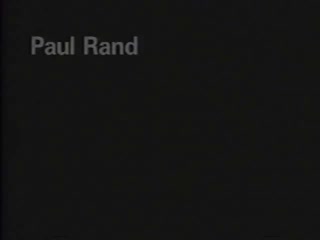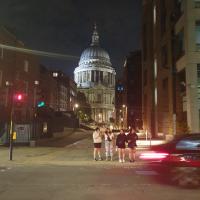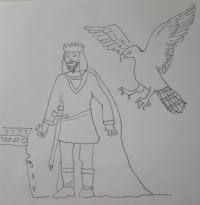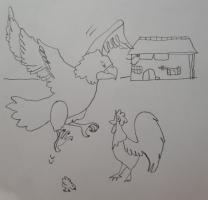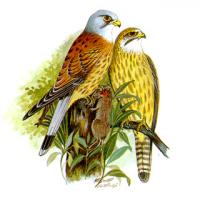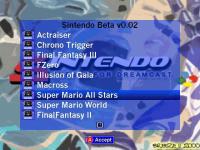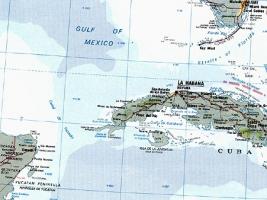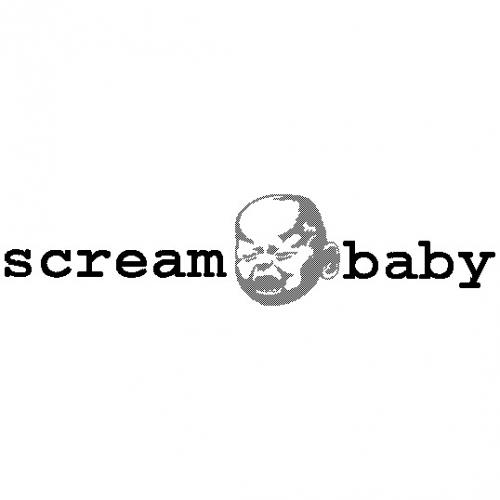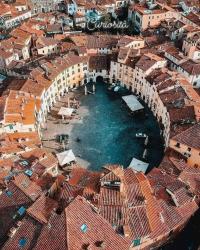Interview with Falco Paul
RECOLLECTION issue 3

By Jazzcat
The man behind the sound of 20CC. He was involved with legendary productions such as So-phisticated III and Dutch Breeze and worked together with Dutch legends Reyn Ouwehand and the late Edwin Van Santen. Please welcome to the pages of Recollection, Mr. Falco Paul...
R)
Thanks for taking the time for this interview and welcome to the Recollection magazine, please introduce yourself to the audience.
F)
My name is Falco Paul and I live with my family (wife and three kids) in the The Netherlands in a small village called 'Lisse'. I've got a degree in computer science and nowadays work as a self employed IT project manager; I've always worked in IT, in various (technical) roles. I nowadays oversee large projects primarily focusing on implementing trading systems in the financial sector.
I have a typical 'scene' background; I was involved with many C64 groups and swapped with friends from all over the globe. I visited copy parties and C64 events on a regular basis and made a lot of international friends. I was quite active in the demo scene and also spend a significant amount of time in game development. As I was inspired by the typical C64 'sound' I got into SID music at some point, which ultimately led to the founding of the 20th Century Composers. My main responsibility in 20CC was the continuous development of 20CC and our toolset (SID player technology, track editor and related utilities). I also did a few tunes. When I turned twenty or so I left the scene and 'moved on', although I still find myself regularly visiting C64 sites, listening to Slay radio, loading up tunes from the High Voltage SID Collection and listening to the latest SID tune remakes on kwed.remix.org
R)
When did you first get a C64 and how did you get from just a regular guy with a computer anyone could buy to a guy in the underground scene?
F)
I think I got my C64 in about 1985 or so. I remember my first ever game for the C64 being “Way Of The Exploding Fist” (on tape, LOL). Anyway, I soon started swapping disks with friends from school. I discovered a demo from a certain Dr. Brain. He had left his phone-number in one of his demos. I noted that the area number was associated to a village close to my hometown (Leiden, NL). So I simply called Mr. Brain at one good day, and we soon got befriended. Mr. Brain turned out to be a very nice guy by the name of Bas. He taught me some of the technology underlying his demos. I was already very much into programming at the time (Z80 assembly on Tandy TRS-80 machines) so getting into 6510 assembly wasn't the biggest hurdle for me. Soon we were doing demos together. Things rolled on naturally from that point onwards, and we steadily networked 'into' the local C64 demo/hacking scene. My perspective really widened when I moved into international swapping. I guess it's the usual story for most of use that were into the scene in these days.
R)
Who did you look up to? Did anyone in the scene motivate you and why?
F)
There was a lot of talent around in these early days. It seemed that every next week someone pulled of a new cool trick on the C64 chipset. Borders could open up, sprites were being multiplexed, samples could be played from the SID and so forth. It was all pretty exciting at the time. I remember that in these early days I found the 1001 crew very inspiring (although, like everyone, that had a bit of an attitude). They were 'king off the borders'.
On the SID side of things I was (like so many others) inspired by Rob Hubbard. Later inspiration came from the Maniacs of Noise guys. Charles Deenen was able to push the limits of SID sound design further than anyone before. MON tunes like "That's the way it is (main tune)" are among the best 'sounding' C64 pieces ever (from a technical perspective). It's C64 SID sound design at its very best.
Tim Follin and Martin Galway also managed to have their own distinctive sounds. Their players and sound designs weren't on the same technical level as MON, but they optimally leveraged their compositions for SID based playback. I think Galway deserves special mention in this context, as he was the absolute master of sample playback (i.e. Arkanoid, Game-Over, etcetera).
R)
You've been involved with groups like Black Mail, Amok and of course 20th Century Composers. Can you give us some details on your scene history... how did you enter the groups you've been in? Why did you leave one group to join another? How did 20CC evolve? Relive your C64 scene history - from the beginning up to now...
F)
As outlined before I really sort of started out together with Bas (Dr. Brain) and we later teamed up with some local friends into 'The Dream Team' (demos/swapping). We then broke up, and Bas and I got into a group called 'Mad Squad' for a short time. It didn't take very long before all the guys from the Dream team got together again. This time we grouped into 'Bros' (together with people like BamBam and Coco). After Bros I got into Paninaro. I was never in Amok though...
I got into researching some of the existing music engines. After a few weeks of research and coding I had my own 'alpha' music player alive and kicking. This all lead to the inception of 20CC somewhere in late 1986. I had heard a few Sound Tracker demos from a guy by the name of Edwin van Santen. I called him some day and we quickly befriended. Edwin joined forces and became the lead composer for 20CC; things started to progress rapidly for 20CC from that point onwards. We together started preparing for the 20CC launch event at the 1988 London PCW show. The tunes from that show were spread to a lot of our international friends. The music soon appeared in intros and we sort of became a well known 'brand'. We kept investing time and effort in 20CC and managed to increase the quality of our tracks and player on a monthly basis. I spend an awful lot of time reverse engineering demo and game soundtracks to discover how sounds, FX and player optimizations were done by others. As the years past by and my understanding of the SID widened I was able to build a state of the art player with unique 20CC features such as 'auto-swing' and 'beat accenting'. I focused a lot on having an efficient player so that the 'overhead' of the music engine was minimal. Off course we liked to do commercial games, but that never really got off very well. School simply took up to much time to develop a proper business. So we were mostly working together with other demo groups such as Black Mail to co-develop C64 technology exhibits. It sure was a great and exciting time for Edwin and me!
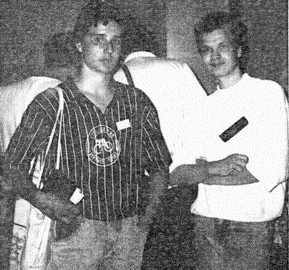
In later years I collaborated a lot with Reyn Ouwehand (independent, MON), who happened to lived quite close to me. Reyn used the 20CC player for a lot of his 'independent' tunes. I did a lot of remixing and sound design for his tunes. It was very inspiring to work with Reyn as he is such an extremely talented musician. I hoped that Reyn would eventually join forces with 20CC, but the hobby ended before he committed to that!
R)
How did the 20CC launch at the London PCW show go, all according to plan?
F)
The show by itself was much more a 'milestone' than anything else. We didn't get any direct business or contracts though, as we were really too young and missed streetwise-ness at that point... Nevertheless, the launching event was important as it allowed us to focus energy on getting the demo set done.
R)
Remembering back I seem to recall EVS had some disagreement with you and 20CC died. You then joined Black Mail but then 20CC was restarted again and you rejoined, do you recall any of this?
F)
We only co-produced one or two demos with Black Mail; neither Edwin nor I actually ever joined Black Mail. However, both Edwin and me knew a few guys in Black Mail and we visited each other on a few occasions, which was a lot of fun.
I don't recall ever having really any disagreement with Edwin, although he obviously wasn't too pleased when I tried to persuade Reyn Ouwehand to join the 'dark side' (i.e. 20CC). I guess he disliked the idea of having two composers in 20CC and thus loosing the 'Prima Donna' role (which is only natural). But other than that, we were pretty much aligned in vision and state of minds.
In the end I basically just lost interest in the 20CC project. I had invested a lot of time into the project, and the returning 'payoff' was ultimately a bit limited (although we had a lot of fun). At some point you move on in life with other things, and this is really what happened more than anything else.
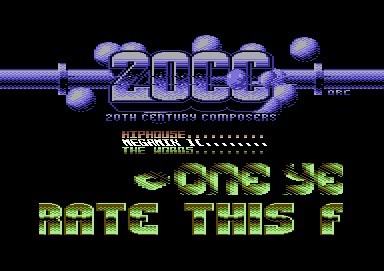
R)
Edwin's girlfriend was in 20CC too right? I seem to remember EVS telling me she was in the status?
F)
Joyce was most certainly not engaged with 20CC during the time I was actively involved with the group. However, as you know Edwin continued with 20CC some time after I had left, and perhaps the two did in fact team up in the aftermath of 20CC. It was definitely never brought to my attention before...
R)
Something that has caused debate in the scene is the EVS versus Markus Muller tune used in many Papillons-crack intros, it was supposedly made by EVS and some claim by Muller. People are trying to know who between the two made the song which was later renamed and moved into the directory on HVSC of Markus Muller. The thing is, even if HVSC seems quite convinced that it is a Markus Muller tune, there are indications that it is indeed EVS' tune... maybe you would know something about this? (the problem is, they both claimed to have made it)
F)
We produced a lot of material for the PCW show and there were loads of promising (but often unfinished) tracks. The tunes we released on the PCW show were just the ones we could finalize in time. I literally collected a hundred or so song 'snippets' during the 20CC period that could have been produced to full tracks. We often captured the first few beats of an inspiring chord or melody progression with an accompanying 'initial' rough bass/drum support track. Upgrading these partial tunes to full songs is a lot of hard work, so most snippets are actually never promoted to full releases. In fact, I think there are easily ten or so snippets for each full track produced. So Edwin could very well have produced a partial tune that later became the Papillion intro tune. I didn't personally work on the early inception track, so there is no way that I can validate Edwin's claims and/or proof anyone right or wrong.
Having said that: Edwin explicitly stated that his track had been copycatted when he first heard the Papillion demo. He was genuinely upset when someone challenged him as being the composer. To me, there is no way that I can validate or 'proof' his claims. But why would he lie about it - I really don't see why one would bother with these sorts of statements unless you are the rightful author! Anyway, it's now more than twenty years ago, and I don't have a C64 (nor any of the original disks) to provide some form of definite 'proof'. However (for what's it worth): the Papillion track does have obvious style similarities with the 'official' PCW show track...
R)
Something else that is even more known than the 'Vlindertjes' debate is the delayed release of one of the most famous demos ever on the C64 - Dutch Breeze. I remember this production started in 1989 or something and took two years to be completed. And why was the release delayed so much? Can you tell us about any meetings or discussions between the producers back then?
F)
The Dutch Breeze work was not done on under the 20CC 'umbrella', but rather as a personal corporation between Reyn Ouwehand and me. The completion of the music remixing and sound editing alone took like two months. Most of the tracks were explicitly composed by Reyn for Dutch Breeze; other tracks were unfinished earlier developed tracks and got upgraded and finalized for the demo. The tracks are among some of the best that I did (in terms of mixing and sound design). This was definitely at a point in time where Edwin was a bit pissed off with me for engaging with Reyn.
Even though the Dutch Breeze demo music is not an official 20CC release, the player is the 20CC music player, and all sound design, remixing and mastering was done by me. So I was definitely involved a lot. All this obviously happened at a point where I was working very closely with Reyn Ouwehand and less so with Edwin.
R)
How would you describe the SID chip, the music and the general feeling of composing on C64 to an outsider?
F)
Obviously the SID is a milestone achievement in terms of synthesizer / integrated circuit engineering. The most noteworthy SID shortcoming is the limited number of channels. I would have absolutely loved to have (say) eight channels to play with. Just imagine what we could have done with that! What I like in the SID is that you can recognize any SID tune from a mile away.
Overall, the SID sound really shines on the 'feel good' type of tunes. The sound has such a distinctive 'happy' sounding personality. Combined with the right tune it can make me smile any time of the day. The tonality is distinctive and absolutely unique. Obviously technology has moved on and we now have far superior capabilities. But that's really irrelevant; I can still very much enjoy listening to (original) SID tracks. For me the SID sound does not feel outdated at all. In fact, I actually prefer the original SID songs as opposed to some of the modern remakes.
It took half a decade or so before the Commodore community could fully tap into its complete potential. I believe that we did ultimately manage to drive the SID to the limits of what it can 'reasonably' do. The 20CC player could do all the tricks like double/triple/quadruple speed playing, hard and soft oscillator restart, sample play, advanced pulse modulation, voice 3 oscillator/envelope feedback to the filter and many other cool tricks.
There have been a few new interesting recent developments on the SID (real time delay tricks, automatic echo, etc), so people continue even today to find new ways to rock the chip. It's also amazing to see all the SID based hardware that is available today. Obviously, a lot of SID reverse engineering has been done over the last decade. People like Dag Lem have researched the SID internals to a depth that is absolutely impressive.
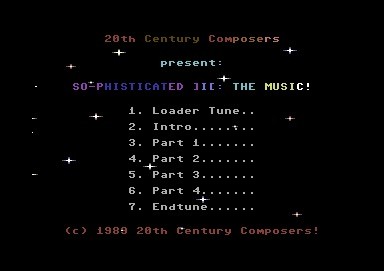
R)
You had a brief moment with the cracking scene in your early days, groups like Dream Team/Bros and Paninaro. How would you describe these early days, how did it feel to go from one bigger group to the other etc?
F)
Above all, it was exciting and fun. We had a large local community of ten or so guys that were involved in the scene. Many of them met up daily. There was off course the occasional good game to play (and work to be done), but we also engaged in a lot of 'normal' fun activities (as a regular normal bunch of guys). Sometimes things were a bit nerdy (like staying up all night to do a release), but overall I have fond memories of the time. I guess in the end it's really more about the people than about the things you do as a group. But we were very active, and the things we did were fun. We maintained a lot of international contacts. Just imagine what could have happened if we would have had access to all the internet connectivity that we now take for granted!
R)
Demo scener versus cracking scener - back in the old days the scene was easily divided. How would you describe each type to someone not in the scene?
F)
I was actually in both scenes so I'm in a position to comment on both sides. First of all, neither one is better than the other. The demo scene is coder and artist focused, whilst in the cracker/trader scene 'traders' and 'group leaders' are often the most 'dominant' roles. If you had access to unreleased software titles than you were almost like a half God in a cracking group. It was very hard in the Netherlands to get access to unreleased titles. It was probably very hard in any country, but I can most certainly state that we had a lot of problems getting 'raw' material :) ...it was an ever ongoing search for goodies that we could release!
As for demo groups: it's more of a lone existence; you tend to do a lot of hard work, then meet up with your fellow group members to discuss, evaluate and integrate, only to go back to the code/music/whatever for some more hard work. As a coder you would need to study (read: reverse engineer) your competitors codes to understand all about these complicated VIC and SID tricks. It's a different sort of life, where you spend a lot of time in front of your C64.
R)
In your mind, who were the people or groups in the early days that were the ones who inspired or impressed? Is there any particular products or people that you could mention?
F)
Some of the more impressive game programmers were Chris Butler (Power Drift, 720, Commando, Ghost & Goblins, Space Harrier), Dave Collier (Daily Thompson, Hyper Sports, Yie Ar Kung Fu, Rambo, Terra Cresta, Target Renegade, Arkanoid, Green Beret and Combat School) and Dan Philips (Armalyte, Hunters Moon and Last Ninja 3). These guys have made some amazing games that still show a lot of quality even by today's standards.
On the music side I was definitely inspired by music from people such as Thomas Morgensen, Johannes Bjerregaard and Tim Follin. But there was a lot of musical talent besides these three gentlemen. Tel, Hubbard and Galway were obviously inspirational as well.
On the graphic side we have seen so much technical progression in image quality, with inventions such as super hi-res / interlacing / FLI and combinational modes. People like DeeKay have shown us some amazing pictures that you would have never expected to be possible on a 'mere' C64. But in traditional bitmap modes I really like a lot of Steven Thomson and Steve Day's work. Pieces from Joachim Ljunggren's are also incredibly inspiring to watch.
R)
What is your definition of lame and elite? (in the context of the old days on C64) examples?
F)
The elite people are obviously the creme-de-la-creme of the scene, such as the top cracking groups that would always release the hottest titles first. Or demo coders that would find new and innovative manners to manipulate the C64 chipset and teach the good old C64 beast a few new tricks.
Lamers are the inverse of the elite, for example 'cracking' groups that did re-crack's (repackaging someone else's hard work), or coders that stole other people software routines without giving proper credit (the plagiarists). So a lamer may be defined as someone that is willingly breaking some of the unwritten scene 'big rules'. But the word lamer was generally used for anybody you didn't like, or perhaps even simply had at a lower rank than you had. If you were trading with someone for some time and continuously got disks with old shit from them, than hey, for sure they were lamers!
R)
Do you think when a musician or talented computer person gets famous that it interferes with their work? Or does it make it better?
F)
Usually the two come together; talent and effort may get rewarded with fame, and fame will usually ignite further passion with the artist, usually driving that person to perform better. So fame may work as a sort of 'positive feedback mechanism'. As an artist you must remain vigilant though; releasing crap is a sure-way to lose respect in a community. Everybody has seen these examples (and not just in the C64 scene).
R)
Is there any musical background in your family?
F)
Yes, my father played piano and my mother flute (but not on a professional level).
R)
What are your musical influences away from the C64?
F)
I listen to quite a bit of 'alternative' pop music (mostly British groups, such as Keane, Snow patrol, Coldplay and so forth). But I generally like many styles of music, including genres such as dance and classical (late baroque music in particular, with George Frideric Handel in particular coming to mind). I also still like to listen to C64 music. I tend to like the original pieces usually more than the remakes (as may be found on remix.kwed.org), but some 'out-of-the-box' remakes are very inspiring and outperform the original tunes.
I've found that I tend to like chip and console music in general. I also like a bit of Anime / Japanese pop music; I've found it to be a style that is in fact closely linked with chip music.
Ultimately, a style is a collection of many artists and tracks that have some similarity in appearance. Each style will have its share of crap, bog standard and excellent work. The trick is obvious to create a collection of the finer pieces. But to fully appreciate the pearls one first need to listen to a good share of crap tunes. It's funny though; if I play excellent C64 tracks at home then the wife and kids usually go nuts after just a few minutes. They simply can't attune to the style... so the love for C64 music is obviously what one would call an 'acquired taste'!
R)
Do you think the scene made the way for your current role as IT project manager? Was it a stepping stone in life?
F)
When it comes down to IT in general: absolutely! Maybe not so much for project management as that is really a different sort of skill; although running a composer group is definitely a bit like project management.
In general one sees that apples usually don't fall too far from their trees; a lot of the young composers pursued a career in music later in life (i.e. Edwin, Reyn Ouwehand). Most of the (demo) coders seem to have ended up in IT jobs. And many of the 'pixel artists' ended up in creative jobs (artists, web and industrial design, marketing, etc).
R)
If the choice was yours - What would you like to be remembered for on the C64?
F)
I was foremost the 20CC player technician and group manager; most of the fame went to guys like Reyn and Edwin. That's how it works, and it's never been a problem for me.
Ultimately, I'd like people to think of me as someone that helped transform the SID into a true musical instrument. I invested a lot of time into researching the SID chip, and truly loved every moment of it.
Some of my best sound design was done in 1991; if you are interested in that aspect then make sure to check out some of the tracks that I did for Reyn, such as Super Trucker and Heli Rescue. I still feel proud of what we (as in: the entire community) were able to do with the SID chip. There were still plenty of ideas to further work on, but at least for me, that's where the journey ended.
R)
Having an opportunity to say hello to individuals, fans and the like through a real C64 production is quite rare in 2010 - here is your chance...
F)
First of all, a BIG HI to Paco, Bas, Ruud, Gaby, Andre and everybody that came to the 'Haagweg' back in the old days. A greeting to Reyn is definitely in place here as well (BTW: everybody should check out his YouTube channel)! Finally, a big thank-you to everyone that mailed me and kept in touch over the last few years; incredible that the scene is still so much alive!
R)
Any last words to leave a final impression on the audience?
F)
Memory is a way of holding onto the things you love, the things you are, the things you never want to lose. So keep playing all the great SID tunes - our past is not even past!









